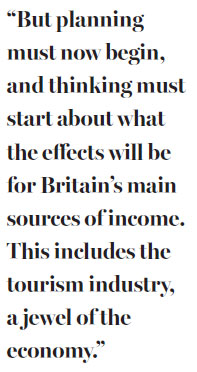Planning key to ensure UK's attraction
Updated: 2016-07-29 08:01
By Graham Miller(China Daily Europe)
|
|||||||||
To make up for fewer tourists from the EU, Britain should work harder at welcoming Chinese tourists
It has now been more than a month since Britain's referendum on leaving the European Union. While there is a growing sense of a direction of travel, the most obvious thing to emerge is that almost no planning was done on what Brexit would entail.
There will be a very difficult process ahead, as decades of economic and social policy needs to be rewritten.
But planning must now begin, and thinking must start about what the effects will be for Britain's main sources of income. This includes the tourism industry, a jewel of the economy.
Britain's 36 million overseas tourists were worth more than 22 billion pounds ($28.8 billion; 26.3 billion euros) last year, but of these only 269,631 were from China. The number was up 82 percent compared with 2011 and, most tellingly, it represented a 144 percent increase in spending by Chinese tourists.
So what will Brexit mean for tourists from China? Well, the most obvious effect is that the declining value of the pound that we see now will make visiting Britain cheaper. Chinese tourists are generally price-sensitive.
Against the Chinese renminbi, the pound is nearly 10 percent cheaper than this time last year, while the euro is more than 9 percent more expensive. Chinese tourists are renowned for their love of shopping, so a cheaper pound will mean they can buy more designer clothes, watches and other items.

Yet few of the designer products sought out by Chinese tourists are actually made in Britain. They are brought in from European countries, and so potentially could fall victim to the increased costs of imports caused by a lower pound. This could mean that the potential price-saving of coming to Britain is not as pronounced as is being projected.
Price is, of course, not the only reason to visit. And so while the value of the pound is beyond the control of the tourism industry, the industry can work hard to ensure that Chinese tourists who do come have an incredible experience.
Britain will need to develop alternative markets to replace the likely reduction in tourism from mainland Europe. This will be good news for Chinese tourists, as investment will be put into making the country more attractive to them.
My colleague at the University of Surrey has conducted research into the satisfaction of Chinese tourists with the services in the retail sector in Britain compared with in Hong Kong. He found that satisfaction levels regarding Britain were not as high as Hong Kong. The same results applied to restaurants and hotels.
So language expertise, training in cultural differences and developing menus for Chinese guests are all ways in which tourism products can be better designed for this new and important market.
There are other things Britain can do, too.
The power of Chinese social media (the instant-messaging service WeChat, for example) should not be overlooked. The impact of social media on Chinese consumers is much stronger than in other countries. A good experience would lead to positive word of mouth.
New Zealand has cleverly used a Chinese celebrity for tourism promotion, something the British tourism industry and VisitBritain could learn from.
A final area where improvement can be made is in easing the visa requirement for Chinese businesspeople and tourists. Efforts have been made to extend the six-month, multiple-entry visa to a two-year period, and to allow a joint application process for visas to Britain and Belgium, both of which make it more convenient for Chinese tourists.
Post-Brexit, the joint application for Britain and Schengen visas may be subject to uncertainty during negotiations between the British government and Europe. Britain has considerably increased its connectivity with China, meaning there is a vast array of flights and options to make the journey. This benefit survives Brexit, and so while the effect on exchange rates may fluctuate, the country needs to use this opportunity to show China how much we value its visitors, and really work to improve their welcome and experience.
The author is head of University of Surrey's School of Hospitality and Tourism Management. The views do not necessarily reflect those of China Daily.
(China Daily European Weekly 07/29/2016 page9)
Today's Top News
Obama, Merkel stress anti-terror cooperation
Downing Street cat fight: Larry vs Palmerston
No explosion, no injury report in Germany: Police
Geneva airport tightens security after French tipoff
Bill Clinton portrays Hillary as 'change-maker'
Priest, 84, killed in France, attack claimed by IS
Knife attacker in Japan kills 19 at disabled center
Michelle Obama rocks Democratic convention
Hot Topics
Lunar probe , China growth forecasts, Emission rules get tougher, China seen through 'colored lens', International board,
Editor's Picks

|

|

|

|

|

|







